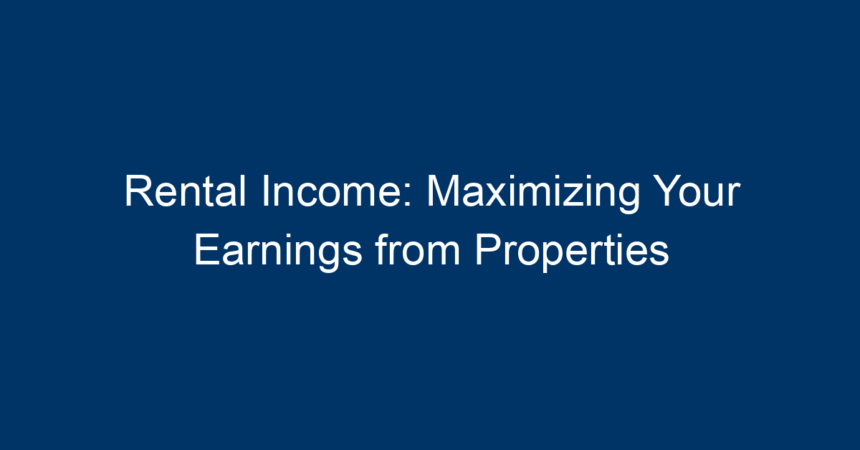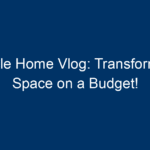In today’s dynamic real estate market, property investment shines as a lucrative avenue for generating passive income. Rental income, the money earned from leasing out a property, can significantly bolster your financial portfolio. However, maximizing that income requires strategic planning, knowledge of the rental market, and efficient management practices. This article will guide you through the crucial steps to optimize your rental income, equipping you with actionable insights for success.
Understanding Rental Income
What is Rental Income?
Rental income is the revenue generated from renting out residential or commercial properties. Whether you own a single-family home, an apartment, or a commercial space, this type of income can provide a consistent cash flow.
The Importance of Rental Income
For many investors, rental income serves as a primary source of passive income, supporting retirement plans, funding education, or enabling lifestyle choices. It’s not just about acquiring properties; it’s about turning them into effective revenue-generating assets.
Evaluating Your Property
Location, Location, Location
The significance of a property’s location cannot be overstated. Properties situated in desirable neighborhoods generally attract higher-paying renters. Consider factors like proximity to schools, public transport, shops, and amenities. Conduct thorough market research to understand rental trends in your chosen area and adjust your investment strategy accordingly.
Assessing Property Condition
Properties in good condition are more appealing to renters and may command higher rents. Before renting out, ensure your property meets safety standards and is maintained properly. Consider making necessary renovations or upgrades, such as modern appliances, fresh paint, or landscaping improvements. These enhancements can increase marketability and rental price.
Setting the Right Rental Price
Market Analysis
To maximize rental income, understanding the local rent market is crucial. Tools like online rental listings, real estate websites, and local rental guides can provide valuable insight. Analyze comparable properties, known as “comps,” to determine a competitive yet profitable rental price.
Value-Added Pricing
Don’t just base your rent on market averages. Consider the unique features of your property—such as a renovated kitchen, additional amenities, or energy-efficient systems. These characteristics can justify a higher rental price.
Marketing Your Property
Effective Listing Strategies
Once you’ve prepared your property, a solid marketing strategy is essential. Here are several tactics to increase visibility and attract tenants:
-
High-Quality Photography: Invest in professional photos to showcase your property. Outdoor and indoor shots highlight the best features and encourage potential tenants to schedule viewings.
-
Detailed Descriptions: Write engaging and detailed property descriptions that include all relevant information. Highlight features such as square footage, the number of bedrooms, parking availability, and nearby attractions to catch prospective tenants’ attention.
- Leverage Online Platforms: Use rental websites and social media platforms to list your property extensively. Websites like Zillow, Craigslist, and dedicated rental platforms greatly expand your reach.
Open Houses and Showings
Hosting open houses can be an effective way to attract potential tenants. Ensure the property is clean and presentable. Prepare to answer questions and sell the benefits of living in your space.
Managing Tenants Effectively
Tenant Screening Process
Selecting the right tenants is vital for maximizing your rental income. A solid tenant screening process can save you from future headaches:
-
Background Checks: Verify credit histories, rental histories, and criminal backgrounds. This step ensures you select responsible tenants who can meet their rental obligations.
- Interviews: Conduct interviews to assess their character and reliability. Talk to previous landlords to gauge their rental behavior.
Maintaining Good Relationships
Building and maintaining a positive relationship with tenants can lead to longer leases, reducing turnover and vacancy rates. Being a responsive landlord makes tenants feel valued:
-
Prompt Maintenance: Address maintenance requests promptly to keep your property in good condition.
- Clear Communication: Establish open lines of communication to discuss any issues or questions that may arise.
Enhancing Rental Income through Upgrades
Property Improvements
Investing in strategic improvements can boost your rental income. Some ideas include:
-
Energy-Efficient Systems: Installing energy-efficient HVAC systems, windows, or appliances can decrease utility costs for tenants, making your property more desirable.
- Amenities: Consider adding amenities such as laundry facilities, upgraded flooring, or smart home technology. These enhancements can justify higher rents and attract quality tenants.
Long-Term vs. Short-Term Rentals
Deciding between long-term and short-term rentals (like Airbnb) can also influence your income. Analyze your local market to determine which model aligns with your goals. Short-term rentals can yield higher nightly rates but may require more management.
Financial Management of Rental Income
Accounting Practices
Keep meticulous records of all rental income and expenses. Software options like QuickBooks or specialized property management software can simplify this process. Tracking financial performance helps identify profit margins and manage taxes effectively.
Preparing for Taxes
Rental income is taxable, so be prepared to report it accurately. Familiarize yourself with tax deductions available to landlords, such as property management fees, maintenance costs, and depreciation. Consult with a tax professional to ensure compliance and optimize your tax situation.
Conclusion: Actionable Insights for Maximizing Rental Income
Maximizing your rental income involves a blend of strategic planning, effective management, and ongoing market analysis.
-
Thoroughly evaluate your property to ensure it meets market demands and is well-maintained.
-
Set competitive rental prices by conducting market analyses and adding value through enhancements.
-
Market effectively using high-quality photos and targeted online listings to attract potential tenants.
-
Implement a rigorous tenant screening process and maintain good relations with tenants to promote long-term occupancy.
- Consider property upgrades that can make your property more attractive and justify higher rents.
By adhering to these principles, you can not only increase your rental income but also enjoy the rewards of being a successful property owner. Real estate remains a resilient investment; with the right strategies, your properties can become robust sources of income well into the future.




